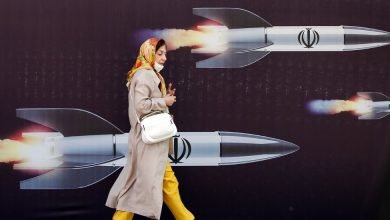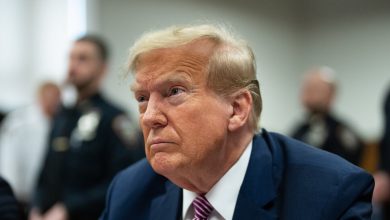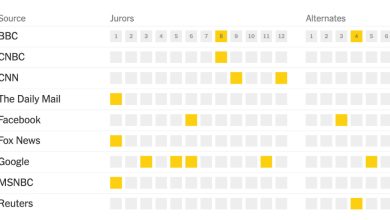The Price of Putin’s Belligerence

As his ruthless invasion continues, Vladimir Putin is trying to break Ukraine by demolishing its cities and brutalizing its people. Each day brings fresh horrors. A family killed while crossing a bridge to safety. Fathers and children touching hands and parting. A maternity hospital blasted into pieces in Mariupol, where roughly half a million people are under siege.
The United States, the European Union and other countries, including Australia and Switzerland, have responded by imposing economic sanctions on Russia with a severity that has few parallels among nations not at war. On Friday the Biden administration added to those sanctions by announcing that the United States would join the European Union and other allies in moving to suspend permanent normal trade relations with Russia, which would put it in the company of Cuba and North Korea. Corporations are fleeing, too. McDonald’s first Moscow restaurant, opened in 1990, was a powerful symbol of Russia’s openness to the West. On Tuesday, McDonald’s temporarily closed all of its nearly 850 restaurants in the country.
The sanctions are raising the price of Russia’s belligerence and can degrade its capacity to pursue this campaign of terror, or others, by cutting off access to raw materials and supplies.
But there is danger in relying on sanctions to satiate public fury. While symbolic gestures like impounding yachts have their place, Western nations must be careful not to punish individuals who have nothing to do with Mr. Putin’s war, as in Lithuania’s decision last week to cancel a donation of Covid-19 vaccines to Bangladesh after that nation abstained from a United Nations vote on a resolution to condemn Russia. There is also good reason to wait and see the effect of measures imposed so far before going further. Russia is already facing a devastating economic crisis from the sanctions in place now.
Policymakers are wrestling with two questions that don’t necessarily have the same answer: What can be done to help Ukraine? And what kind of relationship should Western nations maintain with an increasingly belligerent Russia?
To help Ukraine, the United States has provided weapons and economic assistance, and Congress on Thursday approved $13.6 billion in additional aid. Despite Russia’s horrific targeting of civilians, the Biden administration has wisely emphasized the need for military restraint, rejecting calls to enforce a no-fly zone above Ukraine. Such a policy would be tantamount to a declaration of war against another nuclear power, because it could require the United States to shoot down Russian planes over Ukraine. America can best avoid worsening this terrible conflict by making clear that it will honor commitments to its NATO allies but refrain from direct military engagement in Ukraine.
Similar care is needed in the realm of economic policy. Sanctions are most likely to help Ukraine if demands and terms for lifting those sanctions are clearly communicated to Russia. Mr. Putin has portrayed Western sanctions as an unprovoked move to destroy the Russian economy; there is little benefit to feeding the view that he is being unfairly persecuted. Clear goals can also help Western governments maintain public support for policies that are likely to impose economic pain on their own citizens. And clarity will help to maintain a coordinated international response, which is likely to become more challenging the longer the conflict continues.
Beyond the imperative to respond to Mr. Putin’s aggression, this conflict has also clarified the need for America and Europe to loosen the economic ties with Russia that were so carefully built over the past three decades. Economic relationships should fall more closely in line with other national priorities. Europe, in particular, is confronting the grim reality that its dependence on Russian gas means that it is funding Mr. Putin’s war.
Immediate steps to reduce dependence on Russia are likely to rest heavily on other sources of carbon-based fuel. But nations regretting their reliance on Putin’s Russia can simultaneously pursue a shift away from dependence on any petrostates by accelerating the development of renewable energy sources. The Washington Post reports that White House officials have explored a plan to manufacture energy-efficient heat pumps for European households, which could help reduce Europe’s use of Russian natural gas by about 2 billion cubic meters over the next year. Even if the impact is relatively small, about 4 percent of a goal set by the International Energy Agency, that kind of idea is worth pursuing as a meaningful contribution to the security of European nations and the United States.
At the same time, Western nations should carefully consider the value of policies that restrict ordinary Russians’ access to the opportunities available to those who participate in an interconnected global economy.
Mr. Putin’s savage invasion of Ukraine has shattered the post-Cold War project of interlacing Russia with the democratic nations of Europe. As the West once again finds itself pitted against Russia, it is worth remembering that the Cold War was won by those who took better care of their own people and held out the prospect of a better life to those on the other side of the divide.
The Times is committed to publishing a diversity of letters to the editor. We’d like to hear what you think about this or any of our articles. Here are some tips. And here’s our email: [email protected].
Follow The New York Times Opinion section on Facebook, Twitter (@NYTopinion) and Instagram.




